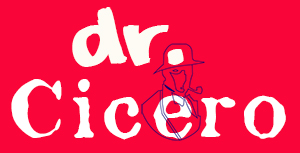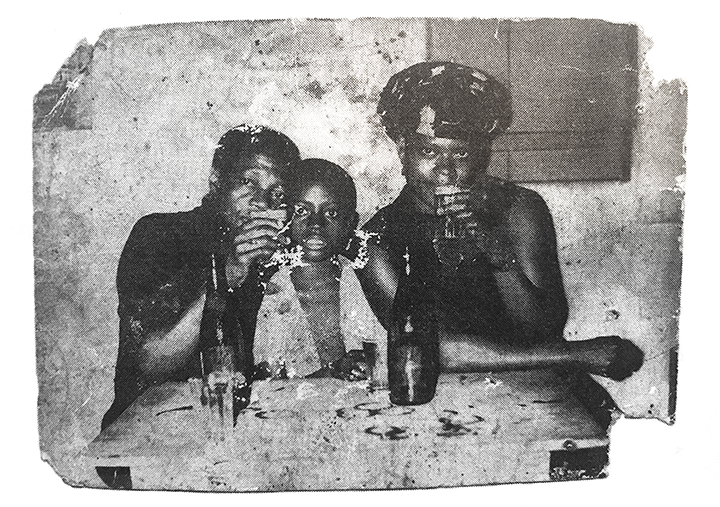











My Mother
Is a Miss

The photo’s in black and white, with a bit torn off at the bottom, on the right-hand side. It was taken at the end of the 1970s, one afternoon in the Joli-Soir district.
I had come to meet my parents in this bar, where we are all sitting at a table. The two of them have glasses raised to their lips, and mine is on the table. It’s filled with beer, my mother insisted on this, she didn’t want anyone to think I was only there for the photo. We had to make it look like I had been sitting drinking with them for some time. I can still hear my mother acting like some finicky film director, to the photographer’s slight surprise:
‘Hold on, monsieur, we’re not ready! First get rid of those flies buzzing round the table! A fine way to mess up people’s photos! I’ll tell you when to press the button!’
She swept her eyes across the room, hoping she could put off the moment when he took the picture. A few people entered and were making their way to the back of the bar. She grabbed her chance:
‘What’s all this, then? Did you see that? You can’t even take a photo in this country these days, not since President Marien Ngouabi died! Tell them to stop coming in for a moment!’
Then, turning her attention to us:
‘And you two, act as though the photographer wasn’t there! Especially you, Roger, whenever someone takes your photo you look all tensed up like a snail that doesn’t know which way to turn! What way is that to behave? And you, boy, sit properly now. Sit up straight like a boy scout, like a boy who’s proud to be sitting there between his papa and mama!’
Despite all these precautions, at which the photographer’s annoyance grew, she failed to notice a fourth glass on the table, to my left, in front of Papa Roger. He had bought a drink for the photographer, who had knocked it back in one, without saying thank you, eager to get on with the serious business. Instead of moving his glass out of the way, he had left it there. He seemed completely overwhelmed by his job, which, in order for him to make any money at all, required him to go all round town, from one bar to another, persuading people to have their photos taken. He wrote down your address in an old notebook and came round to your house the next day with the picture. You had to pay him a deposit beforehand. He made sure to print several copies of the same image, since if it turned out to be a masterpiece, everyone was going to want one. He was known in most districts of Pointe-Noire by now. And that day he was blowing his own trumpet in front of my parents, saying:
‘I’m the only one in this town with a Hasselblad SWC! Even the Americans used one when they went up into space! Do the other photographers in this town have one? No they do not! Just me! That’s why they call me Mr Hasselblad SWC!’
Could anyone verify his claims? No one understood his gibberish anyway, all you saw was him pressing a button, and a flash that went off just like on any other camera. But my mother cut him short:
‘Stop prattling and tell us how much the photo costs!’
Mr Hasselblad SWC struck up a ridiculous pose with his camera and, in the blink of an eye, the flash exploded in our faces...
The photo looks different to me now. Perhaps because I’m looking at it in the town where it was taken. It’s as though in Europe or in America it keeps its secrets hidden. I look more closely. My mother dominates the picture. All you see, practically, is her and the scarf round her head. She seems more relaxed than my father and I, who are both trying to squeeze into the small amount of space she’s left us. She wanted to be the one people saw when they looked at the photo. We were just there to highlight her presence, the principal’s impact being very much dependent on the involvement of those playing the secondary roles. This was clearly the impression she wished to create, with the way she is leaning slightly to the right, as though my father and I no longer existed, or as though we were intruding on what she considered her moment of glory, which she would leave for posterity.
She is looking at the camera lens with a little smile, showing she has found the perfect pose. She doesn’t know I’ve got my mouth open, a blank expression, big wide eyes that seem to be asking what the point of this photo is. Normally she would have reminded me:
‘Sit up straight, look, we’re having our picture taken!’
She’d have told me to close my mouth, she didn’t like this expression, considering it unworthy and unflattering.
My shirt is hanging open—perhaps I had lost my buttons again, ‘like an idiot’, as my mother would have said. I admit that buttoning up my shirt was not a priority. I often had my shirt with all the buttons in the wrong holes.
Now I notice various details that I haven’t seen before. For example, my mother’s right shoulder seems to be crushing me, while my father’s trying to keep us propped up. That’s why his head is pressed up against mine. I can see, too, my father’s fingers on my mother’s left shoulder. I think it must be his left arm holding us up and without it we wouldn’t have managed to hold the pose. Lastly, the marks left by the bottles on the surface of the table suggest the waiters didn’t wipe them very often...♦
Copyright © 2016 by Alain Mabanckou. This excerpt originally appeared in The Lights of Pointe-Noire. Published by The New Press. Reprinted here with permission. Translation copyright © 2015 Helen Stevenson


